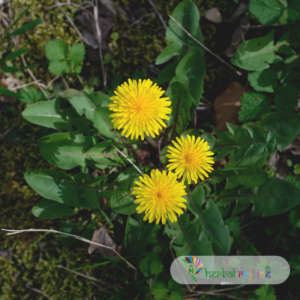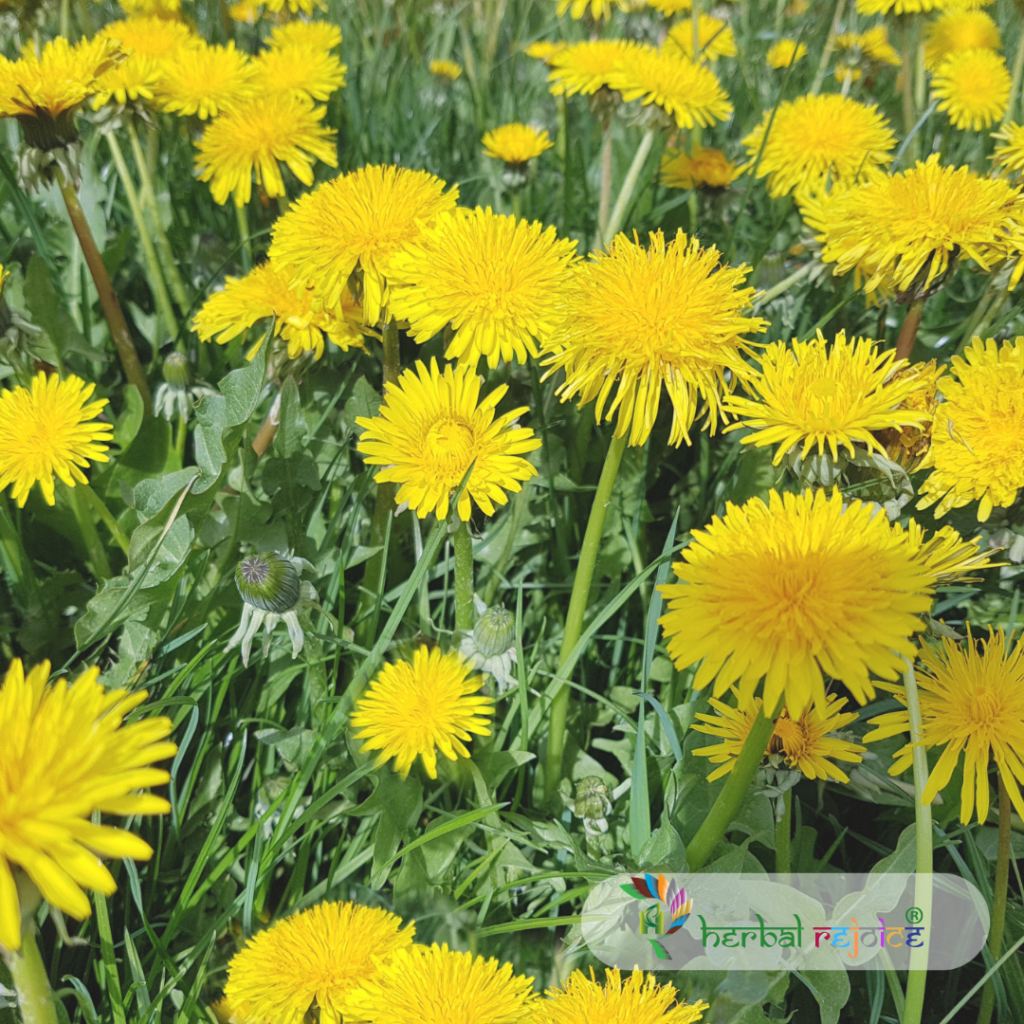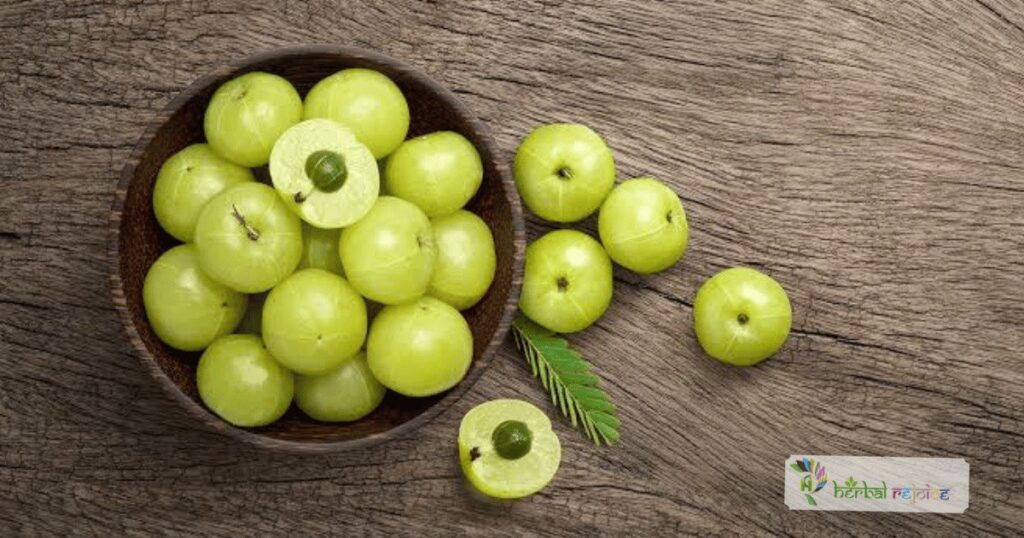Introduction
Common Dandelion (Taraxacum officinale Weber ex Wiggers) is a flowering plant belonging to the Family Compositae; Asteraceae. It is commonly found in the temperate regions of the Himalayas, including the Khasi Hills, Mishmi Hills, Gujarat, and the hills of South India.
In Ayurveda, Dandelion is known as Dugdh-pheni, Luutaari, and Payaswani. In Unani medicine, it is called Kaanful, Kaasani Dashti, and Kaasani Sahraayi (not to be confused with Cichorium intybus, also known as Kaasani).
Medicinal Uses
Dandelion has a variety of medicinal actions. The root is known to possess diuretic, cholagogue, pancreatic and bile duct stimulant properties. It helps stimulate portal circulation, acts as a choleretic agent, and promotes the elimination of plasma cholesterol. Dandelion is commonly used for kidney and liver disorders, rheumatism, and as a general tonic. It is also used in the form of a decoction to treat infective hepatitis.
Key applications of Dandelion include its use in dyspepsia, loss of appetite, and for diuresis. It has been approved for use by the German Commission E and ESCOP in the restoration of hepatic and biliary function.

Phytochemical Constituents
What sets Dandelion apart from other diuretics is its high potassium content. While most diuretics cause a loss of potassium, Dandelion leaves contain significant levels of this essential mineral. The leaves and root of Dandelion also contain sesquiterpene lactones, triterpenes, and sterols such as beta-sitosterol, beta-sitosterol-glucosides, taraxasterol, psi-taratexol, and taraxol. They are also rich in flavonoids, including apigenin-7O-glucosides and luteolin-7-O-glucosides, as well as mucilages and inulin (2-40%). The bitter substances found in Dandelion, such as the amaroids, have cholagogic and secretolytic effects. Recent studies have also revealed the presence of eudesmanolides, which stimulate appetite.
Dandelion leaves and roots have a higher vitamin A content compared to carrots. The polysaccharides and aqueous extracts of Dandelion have shown antitumor activity in animals. Animal studies have also confirmed its anti-inflammatory activity. The diuretic activity of Dandelion is attributed to its high potassium content in both the roots and leaves.
Dosage
The recommended dosage of Dandelion root is 1-3 grams of powder.
Conclusion
In conclusion, Dandelion (Taraxacum officinale) is a versatile medicinal plant with diuretic, cholagogue, and hepatoprotective properties. Its high potassium content and various phytochemicals make it an effective natural remedy for kidney and liver disorders, as well as other health conditions. Incorporating Dandelion into your diet or taking it as a supplement can provide several health benefits. However, it is important to consult a healthcare professional before using Dandelion, especially if you have any underlying medical conditions or are currently taking medications.
Frequently Asked Questions
What is the scientific name of Dandelion?
Answer: The scientific name of Dandelion is Taraxacum officinale Weber ex Wiggers.
Where is Dandelion commonly found?
Answer: Dandelion is commonly found in the temperate regions of the Himalayas, including the Khasi Hills, Mishmi Hills, Gujarat, and the hills of South India.
What are the common names of Dandelion in Ayurveda?
Answer: In Ayurveda, Dandelion is known as Dugdh-pheni, Luutaari, and Payaswani.
What are the medicinal properties of Dandelion root?
Answer: Dandelion root possesses diuretic, cholagogue, pancreatic and bile duct stimulant properties. It helps stimulate portal circulation, acts as a choleretic agent, and promotes the elimination of plasma cholesterol.
What are the key applications of Dandelion?
Answer: Dandelion is commonly used for dyspepsia, loss of appetite, and for diuresis. It has also been approved for use in the restoration of hepatic and biliary function.
What makes Dandelion unique as a diuretic?
Answer: Dandelion leaves contain high levels of potassium, unlike most other diuretics that cause a loss of potassium.
What are some of the phytochemicals found in Dandelion leaves and roots?
Answer: Dandelion leaves and roots contain sesquiterpene lactones, triterpenes, sterols, flavonoids, mucilages, inulin, and bitter substances.
How does Dandelion support liver and kidney health?
Answer: Dandelion has hepatoprotective properties and aids in the restoration of hepatic and biliary function. Its diuretic properties help support kidney function.
How does Dandelion compare to carrots in terms of vitamin A content?
Answer: Dandelion leaves and roots have a higher vitamin A content compared to carrots.
Does Dandelion have any anti-tumor activity?
Answer: Polysaccharides and aqueous extracts of Dandelion have shown antitumor activity in animal studies.
Does Dandelion have anti-inflammatory properties?
Answer: Yes, animal studies have confirmed the anti-inflammatory activity of Dandelion.
How much Dandelion root powder is recommended for consumption?
Answer: The recommended dosage of Dandelion root is 1-3 grams of powder.
What are the potential health benefits of consuming Dandelion?
Answer: Incorporating Dandelion into your diet or taking it as a supplement can provide several health benefits, including improved kidney and liver function, support for digestion, and potential anti-inflammatory and anticancer effects.
Is it safe to use Dandelion without consulting a healthcare professional?
Answer: It is generally recommended to consult a healthcare professional before using Dandelion, especially if you have any underlying medical conditions or are currently taking medications.
What are some common traditional uses of Dandelion?
Answer: Dandelion is traditionally used for treating kidney and liver disorders, rheumatism, and as a general tonic.
Does Dandelion have any known side effects?
Answer: Dandelion is generally considered safe when consumed in moderate amounts. However, some individuals may experience allergic reactions or digestive upset.
Can Dandelion be used to promote weight loss?
Answer: Dandelion’s diuretic properties may help with temporary weight loss by reducing water retention. However, it is not a sustainable or long-term solution for weight loss.
Can Dandelion interact with medications?
Answer: Dandelion may interact with certain medications, such as diuretics or drugs that are metabolized by the liver. It is important to consult a healthcare professional before using Dandelion if you are taking any medications.
Can pregnant or breastfeeding women use Dandelion?
Answer: Pregnant or breastfeeding women should consult a healthcare professional before using Dandelion, as there is limited information available regarding its safety during these stages.
Can children use Dandelion?
Answer: It is advisable to consult a healthcare professional before giving Dandelion to children, as the appropriate dosage and safety for children may vary.


